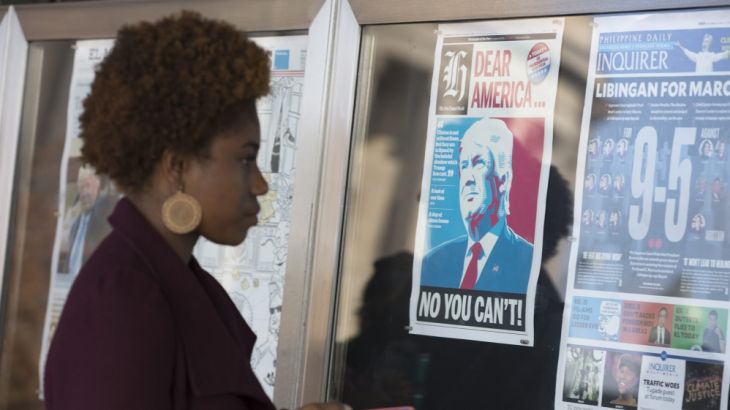Black Americans fear racism, police violence post-Trump
Election of Republican who focused much of his campaign vilifying minority communities has made some Americans nervous.

It’s been about 48 hours since Donald Trump’s surprise win in the US presidential election, but Alicia Scotland-Smalls still cannot shake off a feeling of shock and fear.
“Given that racism was part of Trump’s campaign, I am afraid that racists might feel emboldened to commit acts of violence and discrimination against our community,” Scotland-Smalls, a 29-year-old African American from Greenville, South Carolina, told Al Jazeera.
Keep reading
list of 4 itemsBehind India’s Manipur conflict: A tale of drugs, armed groups and politics
Solomon Islands prepares for ‘most important election since independence’
Six takeaways from first day of Trump’s New York hush money criminal trial
“While at work, I am always on guard because you never know who will come through the door,” the shipping clerk said.
She is not alone in being worried. For many members of the African-American community, Trump’s presidency represents genuine concerns of a resurgence of racism and institutionalised violence against them.
Before the election, Trump’s campaign had focused heavily on minorities and foreigners, with rights groups raising concerns that the election of Trump might legitimise outward racism and physical violence. Just days before the election, a black church in Mississippi was burned and spray-painted with “Vote Trump” on one of its outside walls.
A former reality TV star who was endorsed by far-right groups and politicians, Trump received widespread criticism for a series of misogynistic, racist and xenophobic remarks, including a call for a ban on Muslims entering the US and a pledge to build a wall to block Mexicans from entering the country.
And over the past few days, many Americans have used social media to recount racist attacks that took place following the 70-year-old’s election win.
“The 2016 campaign has regularised racism, standardised anti-Semitism, and mainstreamed misogyny,” Cornell William Brooks, head of the National Association for the Advancement of Colored People (NAACP), said in a statement after Trump’s win.
While the NAACP, the nation’s oldest civil rights group, congratulated the president-elect, it also urged him to be more inclusive and stay away from his brash, unapologetic, racist politics.
“We are now calling on the next president to speak and act with the moral clarity necessary to silence [his campaign’s] racial politics,” Brooks said.
‘Racist attacks might increase’
Trump won the election partly because of the low voting turnout among the black community, which was significantly less than during Obama campaign, according to Bob Starks, professor emeritus of inner city studies at North Eastern Illinois University in Chicago.
Early exit polls reported by various US media showed that African Americans, as well as Latinos, did not support Trump’s rival, Hillary Clinton, in the same way as when President Barack Obama was running for re-election four years ago.
The vast majority of African Americans, who comprise about 14 percent of the US population, have historically and consistently voted for the Democratic Party since the 1930s.
On Tuesday’s election, about 88 percent of African-American voters backed Clinton, less than the 91 percent Obama – the first black president – got in 2012.
“All things considered, we as African-Americans must reassess our stance vis-a-vis both the Democratic and the Republican parties and demand better representation in both parties, especially at this historic juncture,” Starks told Al Jazeera.
With Trump in power, Starks claimed, the African-American community might witness more police shootings, more incidents of racist attacks against them and an increase in mass incarceration.
According to an NAACP criminal justice report, African-Americans constitute nearly one million of the total 2.3 million incarcerated population in the US.
“One in six black men had been incarcerated as of 2001. If current trends continue, one in three black males born today can expect to spend time in prison during his lifetime,” the report said.
‘Stoking fears’
Ahead of the vote, both pollsters and major media outlets consistently predicted a landslide victory for Clinton.
But since then, many have argued that such false predictions ultimately helped suppress the black and Latino vote, as they led both communities to think a win for the Democratic candidate was a forgone conclusion.
Early exit polls reported by various US media showed that African Americans as well as Latinos did not support Trump’s rival, Hillary Clinton, in the same way as when President Barack Obama was running for president.
For Salim Muwakkil, a well-known Chicago radio host, Trump’s victory was not a total surprise.
He argues that Trump’s presidency is part of a global trend of rising extreme nationalism and racism in response to massive immigration to Europe from poorer countries and violent attacks over the past few years.
“Trump’s election indicates that the US is reacting to the same factors that have occurred in Europe in recent years,” he told Al Jazeera.
The president-elect was able to rally the white poor and working-class votes by using anti-refugee “xenophobia” or “racism” to stoke fears and uncertainty among a segment of the electorate against an alleged “growing power of blacks or other minorities”, according to Muwakkil.
But even without these issues, Muwakkil argues that it is hard for any political party to keep control of the White House for more than two terms.
“The irony of it all is that the poor white working-class Americans have elected a billionaire who epitomises an economic policy that was directly responsible for their poverty,” he said.
Follow Ali Younes on Twitter: @Ali_reports